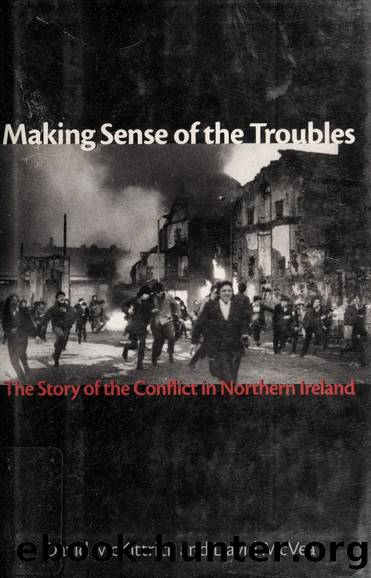Making Sense of the Troubles: The Story of the Conflict in Northern Ireland by David McKittrick & David McVea

Author:David McKittrick & David McVea [McKittrick, David & McVea, David]
Language: eng
Format: epub
Tags: History, Non-Fiction, Northern Ireland, Political Violence, Social Conflict, Social Science, Violence in Society
ISBN: 9781561310708
Google: Z-OD6zU_8uEC
Amazon: 1561310700
Publisher: New Amsterdam Books
Published: 2002-03-18T00:00:00+00:00
Anglo-Irish Agreement
The document Thatcher and FitzGerald formally signed in Hillsborough, County Down, in November 1985 was by any standards a historic one, giving the Republic as it did a significant consultative role in the running of Northern Ireland. The agreement opened with a statement by the two governments that any change in Northern Ireland's status could only come about with the consent of a majority of its people. For the governments, this was clearly an advance on the separate statements printed side by side in the Sunningdale Agreement.
The agreement then unveiled intricately crafted new structures, at the heart of which was an intergovernmental conference to be jointly chaired by London and Dublin ministers. This was to be serviced by a small secretariat of British and Irish civil servants based at Maryfield, a closely guarded office building on the outskirts of east Belfast. At the intergovernmental conference the Irish government could put forward views and proposals on almost any subject. The Republic was given no executive power, but the agreement committed the two governments to making 'determined efforts' to resolve their differences within the conference.
Almost everyone was surprised that Thatcher was prepared to sign such a document. Howe wrote later that the personal chemistry between herself and FitzGerald was decisive, saying that the Taoiseach's 'manifest sincerity over meeting after meeting could not have been more effective'. Thatcher had a reputation of being one of the few British politicians to retain any personal commitment to the Union between Britain and Ireland; moreover, as European and other countries had ample cause to know, she was famously jealous and protective of British sovereignty. That sovereignty was technically untouched by the Anglo-Irish Agreement, yet its nationalist tone was obvious to everyone. It was certainly evident to Unionists, who were unanimously appalled by its contents, believing that it weakened the Union. It was a nightmare for Protestants in general in that they felt spumed and abandoned by a government whose leader was supposed to have strong Unionist instincts.
The Unionist party's approach had been to leave things to James Molyneaux, who was said to have the ear of the people who mattered at Westminster. He had early on opted out of any negotiations, believing that by doing so he was ensuring that no real deal would be possible: his theory was that Britain and Dublin could not formulate an agreement
without the input and consent of Unionist politicians. It was a historic mistake, in that London examined Molyneaux's integrationist approach and found it wanting. His suggestions of modest local government reform and procedural changes at Westminster did not begin to address the central question of what was to be done to improve relations with Dublin and to tackle Catholic alienation and the joint menace of the IRA and Sinn Fein.
Since many Unionists had initially relaxed on being reassured by Mo- lyneaux that their interests were safe, the trauma of the agreement was all the deeper for being unexpected. They saw it as striking at their own sense of Britishness, and saw it too as Britain entering a compact with their ancient opponents.
Download
This site does not store any files on its server. We only index and link to content provided by other sites. Please contact the content providers to delete copyright contents if any and email us, we'll remove relevant links or contents immediately.
Cecilia; Or, Memoirs of an Heiress — Volume 1 by Fanny Burney(31332)
Cecilia; Or, Memoirs of an Heiress — Volume 3 by Fanny Burney(30934)
Cecilia; Or, Memoirs of an Heiress — Volume 2 by Fanny Burney(30889)
The Great Music City by Andrea Baker(21310)
We're Going to Need More Wine by Gabrielle Union(18072)
Bombshells: Glamour Girls of a Lifetime by Sullivan Steve(13108)
Pimp by Iceberg Slim(12931)
All the Missing Girls by Megan Miranda(12747)
Fifty Shades Freed by E L James(12451)
Norse Mythology by Gaiman Neil(11883)
Talking to Strangers by Malcolm Gladwell(11876)
Crazy Rich Asians by Kevin Kwan(8349)
Mindhunter: Inside the FBI's Elite Serial Crime Unit by John E. Douglas & Mark Olshaker(7834)
The Lost Art of Listening by Michael P. Nichols(6472)
Enlightenment Now: The Case for Reason, Science, Humanism, and Progress by Steven Pinker(6405)
Bad Blood by John Carreyrou(5768)
The Four Agreements by Don Miguel Ruiz(5510)
Weapons of Math Destruction by Cathy O'Neil(5036)
We Need to Talk by Celeste Headlee(4868)
